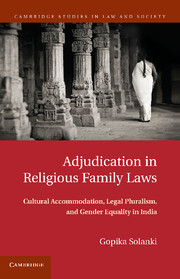 Adjudication in Religious Family Laws
Adjudication in Religious Family Laws Book contents
- Frontmatter
- Contents
- List of Figures
- List of Tables
- Preface
- Acknowledgments
- Abbreviations
- Glossary
- 1 Introduction
- 2 The Shared Adjudication Model
- 3 State Law and the Adjudication Process
- 4 Making and Unmaking the Conjugal Family
- 5 Juristic Diversity, Contestations over “Islamic Law,” and Women's Rights
- 6 Conclusion
- Appendix
- Bibliography
- Index
- CAMBRIDGE STUDIES IN LAW AND SOCIETY
3 - State Law and the Adjudication Process
Marriage, Divorce, and the Conjugal Family in Hindu and Muslim Personal Laws
Published online by Cambridge University Press: 03 May 2011
- Frontmatter
- Contents
- List of Figures
- List of Tables
- Preface
- Acknowledgments
- Abbreviations
- Glossary
- 1 Introduction
- 2 The Shared Adjudication Model
- 3 State Law and the Adjudication Process
- 4 Making and Unmaking the Conjugal Family
- 5 Juristic Diversity, Contestations over “Islamic Law,” and Women's Rights
- 6 Conclusion
- Appendix
- Bibliography
- Index
- CAMBRIDGE STUDIES IN LAW AND SOCIETY
Summary
Introduction
Whereas many academic discourses and popular debates pitt Hindu and Muslim laws as opposite and dissimilar to one another, this chapter, based on the analyses of trends in matrimonial disputes in Hindu and Muslim personal laws, demonstrates that there are many commonalities between judicial bargaining, interpretation, and treatment of cases filed under distinct provisions of Hindu or Muslim religious laws. Indeed, the Hindu and Muslim conjugal families are formed along similar, though not identical lines. In addition, whereas feminist and legal scholars have long assumed that Muslim Personal Law is detrimental to women's interests in part because of the Shah Bano case and the introduction of the Muslim Women's (Protection of Rights on Divorce) Act 1986, we find here that the data do not demonstrate a wide variation between rights accorded to Hindu and Muslim women; in fact, divorced Muslim women have more rights than divorced Hindu women in some instances.
This chapter examines the adjudication process in Hindu and Muslim personal laws in state law and courts, analyzes the substantive and procedural aspects of matrimonial provisions in Hindu and Muslim personal laws, and gives an overview of the relevant trends in matrimonial disputes. It discusses the function of the Family Court in Mumbai, traces the interaction between state and society within the formal legal system, and assesses its impact on the construction of the conjugal family and gender equality in state law.
- Type
- Chapter
- Information
- Adjudication in Religious Family LawsCultural Accommodation, Legal Pluralism, and Gender Equality in India, pp. 91 - 174Publisher: Cambridge University PressPrint publication year: 2011
